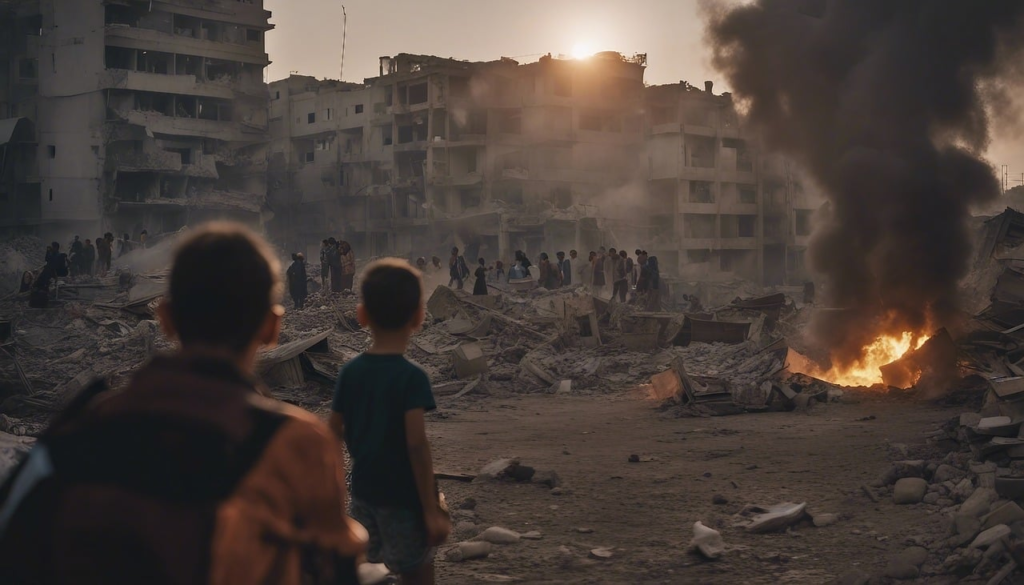Author: Alessandro Peluso - Human Rights Team
Introduction
The humanitarian crisis unfolding in the Middle East, in the Palestinian Territories, is among the most serious in the history of the Mediterranean.
The coexistence of different peoples with different cultures, customs and religious beliefs has accompanied the history of all civilisations that have settled along the shores of the Mediterranean Sea, yet the conflict between the State of Israel and Palestine seems far from seeing a resolution, due to the diplomatic inability of the Western and Eastern blocs to intervene decisively and put an end to a suffering far from the standards of the contemporary world.
The International Court of Justice, whose jurisdiction is recognised by Israel, is examining the case, raised and brought before the court by South Africa, about the possibility of genocide against the Palestinian people at the hands of the State of Israel. However, since this is an open case that will take a long time to see a ruling clarifying the nature of military and non-military operations in the Gaza Strip and the West Bank, the focus in this article will be on the rights of a people, a topic that applies to many other cases of possible persecution of entire populations in other continents, such as the case of Rohingya and Uyghurs people in Asia.
United Nations Charter and Universal Declaration of Human Rights
It is worth reiterating that the Universal Declaration of Human Rights (UDHR) sets out fundamental rights that should serve as a beacon for action by any individual and State. Articles 1, 2, 3 and 5 lay down principles specific to the human being, understood as an equal and free subject, whose identity must not be a reason for discrimination of any kind; and whose person must not be subjected to inhuman treatment.
For the purposes of this discussion, it seems natural to follow the benchmarks of international law and the commitment made by States. For these reasons, reference should also be made to the UN Charter, which should be read in conjunction with the UDHR in order to get a full understanding of the premises.
Article 1(1) of the UN Charter states that “[The purpose of the United Nations is] to develop friendly relations among nations based on respect for the principle of equal rights and self-determination of peoples, and to take other appropriate measures to strengthen universal peace”.
State recognition and peoples’ rights
At first reading, it is plausible to think that this is a principle that applies to States only, as legal subjects, and in particular to contracting states, (i.e. those that are members of the United Nations). However, not only it applies to contracting States, which have agreed to follow the dictates of the signed papers in the broader context of international relations, but it also serves as a general principle of conduct of peoples and States towards peoples and social groups. After all, International Law is based upon customary law, which also benefits from the signature of documents such as the UDHR or the UN Charter.
This detail is crucial to observe with the right lens the dynamics of any case to be analysed, such as that of the Palestinian people. The Palestinian Territories are recognised as a state in fact by a limited number of States, be it for political or legal reasons. According to international law, in fact, recognition is not a necessary and determining factor for a State to be considered as such; however, it is a very important factor on a political level, as it lays the foundations for diplomatic relations between states. Such a point has been long discussed in doctrine, having jurists and scholars debating whether recognition is required (Constitutive Theory) or not (Declaratory Theory). Notably, the latter argument is supported by the Montevideo Convention (1933), which Article 3 establishes that:
“The political existence of the state is independent of recognition by the other states. Even before recognition, the state has the right to defend its integrity and independence, to provide for its conservation and prosperity, and consequently to organize itself as it sees fit, to legislate upon its interests, administer its services, and to define the jurisdiction and competence of its courts. The exercise of these rights has no other limitation than the exercise of the rights of other states according to international law”.

A State is then considered as such if it has control over an inhabited territory and is endowed with autonomous governing institutions, so that it can effectively exercise its sovereignty over the territory. It also means that the State is enabled to exploit the natural resources of its territory, and to provide services to the citizenry, as the population obtains the citizenship of the State to which it belongs.
Conclusion
One therefore gets the impression that the persecution to the detriment of minority populations may be primarily of a political nature. There is no valid reason for differences between peoples to lead to a sharp division between ethnic groups, and States, which enjoy a strong position concerning minorities, should be reminded of the principles of fundamental human rights. Diplomatic action must be incisive in this regard, because a clear-cut Western and Eastern stance on such issues can change the fate of peoples who are suffering countless casualties and seeing their rights denied.
